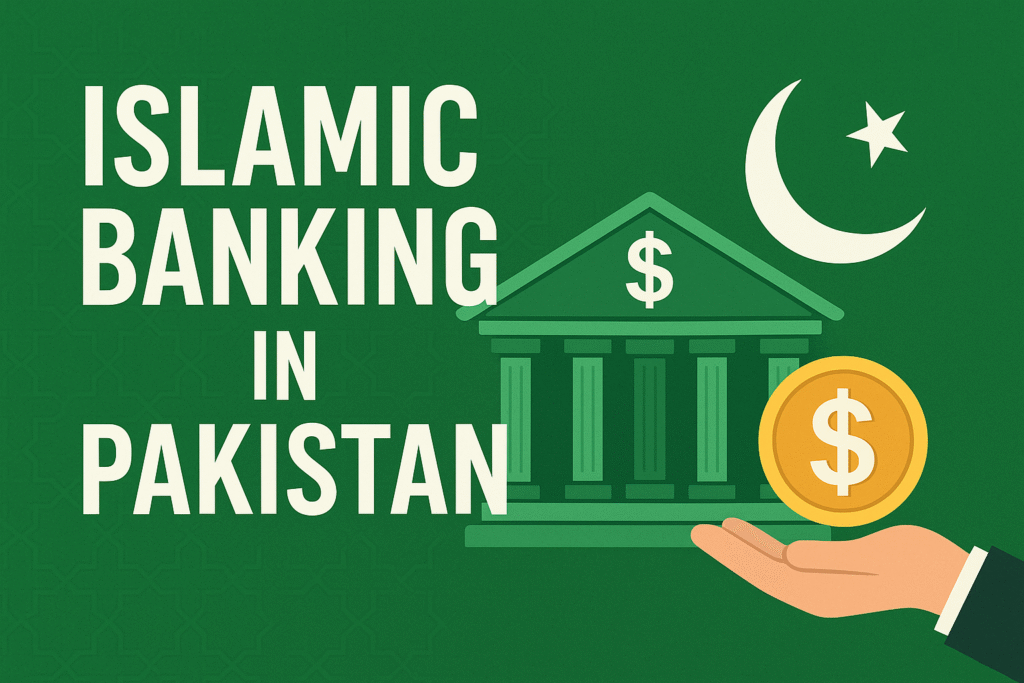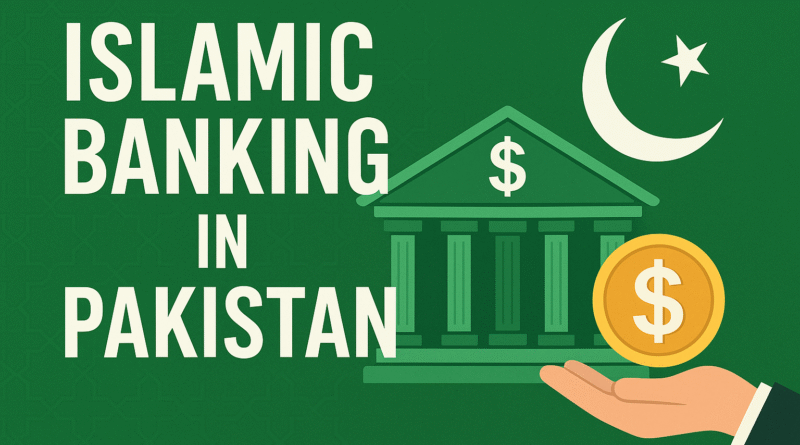Islamic Banking in Pakistan: Growth, Challenges, and Future Prospects
Muhammad Mobasher Ali

Introduction
Islamic banking is a financial system that operates in accordance with the principles of Shariah (Islamic law), prohibiting interest (Riba) and promoting risk-sharing, asset-backed financing, and ethical investments. In Pakistan, Islamic banking has emerged as a rapidly growing segment of the financial sector, supported by government policies, central bank regulations, and increasing public demand for Shariah-compliant financial services. In this article we will see “Islamic Banking in Pakistan: Growth, Challenges, and Future Prospects”
The concept was first introduced in Pakistan in the late 1970s, but it gained real momentum after the State Bank of Pakistan (SBP) formally issued the Islamic Banking policy framework in 2001. Since then, Islamic banking has grown significantly, both in terms of assets and branch networks.
Development of Islamic Banking in Pakistan
The growth of Islamic banking in Pakistan can be traced through several phases:
1. Early Experiments (1970s–1980s)
The government initiated interest-free banking on a limited scale in 1979, but due to inadequate legal and regulatory frameworks, the system struggled to sustain itself.
2. Modern Islamic Banking Era (2001 onwards)
In 2001, SBP introduced a parallel banking system allowing both conventional and Islamic banking to operate side by side. This approach encouraged existing banks to open Islamic banking branches and allowed the creation of full-fledged Islamic banks.
3. Rapid Expansion (2005–Present)
The sector has seen a compound annual growth rate (CAGR) of over 15% in assets. As of 2024, Islamic banking accounts for more than 20% of Pakistan’s total banking industry assets and continues to expand.
Key Players
Several banks are leading the Islamic banking industry in Pakistan, including:
Meezan Bank (the first and largest full-fledged Islamic bank)
Bank Islami Pakistan
Dubai Islamic Bank Pakistan
Al Baraka Bank
Islamic Banking branches of conventional banks such as HBL, UBL, MCB, NBP and Allied Bank
Lorem Ipsum
Shariah Principles Governing Islamic Banking
Islamic banking in Pakistan operates under the supervision of Shariah Boards comprising qualified scholars. The key principles include:
Prohibition of Riba (Interest): No fixed, predetermined return on lending.
Profit and Loss Sharing: Through modes like Mudarabah (partnership) and Musharakah (joint venture).
Asset-Backed Financing: Transactions must be linked to tangible assets.
Ethical Investment: Avoiding sectors such as gambling, alcohol, and other prohibited activities.
Products and Services
Islamic banks in Pakistan offer a wide range of products, including:
Deposit Accounts: Based on Mudarabah or Wadiah
Financing Products: Murabaha (cost-plus sale), Ijarah (leasing), Diminishing Musharakah (home financing)
Trade Finance: Salam and Istisna contracts
Takaful: Islamic insurance products
Regulatory and Institutional Framework
State Bank of Pakistan (SBP) acts as the primary regulator.
Shariah Advisory Committee at SBP ensures compliance with Islamic principles.
Accounting and Auditing Organization for Islamic Financial Institutions (AAOIFI) and Islamic Financial Services Board (IFSB) standards are adapted to local requirements.
Challenges Facing Islamic Banking in Pakistan
1. Public Awareness: Many consumers are still unclear about how Islamic banking differs from conventional banking.
2. Human Resource Constraints: Limited number of trained professionals in Islamic finance.
3. Product Standardization: Variations in Shariah interpretation among banks.
4. Competition with Conventional Banking: Despite rapid growth, conventional banks still dominate the market.
5. Legal Framework: Need for a fully supportive legal environment to replace interest-based clauses in existing laws.
Future Prospects
The SBP has set a target to make Pakistan’s banking industry 30% Islamic by 2025, with measures such as:
Expanding branch networks in underserved areas
Introducing new Shariah-compliant investment opportunities
Enhancing public awareness through campaigns and education
Strengthening Shariah governance frameworks
Given the sector’s resilience and alignment with cultural and religious values, Islamic banking in Pakistan is poised to play a central role in achieving financial inclusion and sustainable economic growth.
Conclusion
Islamic banking in Pakistan has transformed from a niche offering into a major component of the financial system. With supportive regulations, growing consumer demand, and innovative Shariah-compliant products, the sector is well-positioned for continued expansion. However, addressing awareness gaps, standardizing practices, and developing human capital remain essential for its sustainable growth. The article “Islamic Banking in Pakistan: Growth, Challenges, and Future Prospects” is short overview of the Islamic Banking in Pakistan

